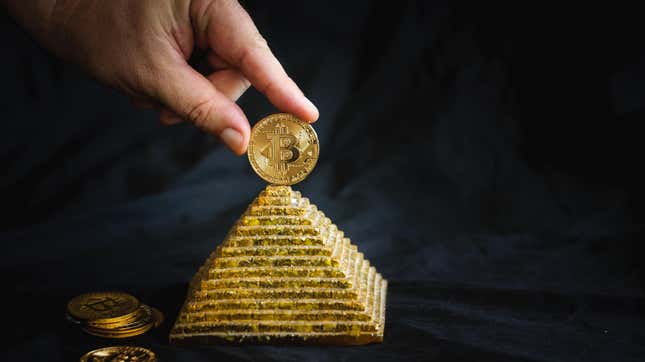
Some crypto critics like Vivaldi CEO Jon von Tetzchner have called the entire apparatus of crypto “nothing more than a pyramid scheme.” It’s an easy claim when you cite the ever-growing number of scams in the crypto scene that have cost users over $1 billion since last year.
Well, at least one of these alleged scams is now being called out as a for sure, legitimate (or really, illegitimate) crypto pyramid scheme for trying to incentivize people to sign up in order to take a cut in crypto, without actually offering any legitimate end product.
On Monday, the Securities and Exchange Commission alleged that 11 people that had helped found and operate the company Forsage were actually operating a crypto pyramid or ponzi scheme, raking in over $300 million from millions of worldwide investors. Most of the founders were recently living in Russia, the Republic of Georgia, and Indonesia. The SEC further alleged three U.S.-based promoters were hired to promote Forsage on its website and social media.
The last four were allegedly part of a group called the “Crypto Crusaders” that promoted the scheme in at least five different states. In its complaint, the SEC said the Crusaders were “engaged in the unregistered offer and sale of securities in Forsage.”
The scheme operated on three blockchains, including Ethereum, Tron, and later the Binance Smart Chain, and apparently took directly from the old multi-level-marketing—AKA pyramid scheme—playbook. The agency said the company didn’t have any actual consumable product to sell, but instead focused on getting investors to create a crypto wallet then buy so-called “slots” in the company’s smart contracts, allowing them to earn from each other person they further recruit below them. This creates a chain (not of the block variety) of people trying to get others to sign on below them in the desperate attempt to make up losses and, eventually, make a profit.
If you’re still confused about what a pyramid scheme is, maybe this video from the good folks at It’s Always Sunny in Philadelphia might help you understand. There are many videos online talking up Forsage, and even more pointing out just how obvious a scam it is. The company website claims it is a “decentralized networking platform” that helps connect people in the “new economic financial system.”
The company’s Twitter is even (more pointedly) lighter on details.
The seven U.S. citizens accused in the complaint are now facing civil penalties from the complaint filed in Illinois northern district court. Two of those alleged promoters, Samuel Ellis of Kentucky and Sarah Theissen of Wisconsin, agreed to settle the charges, according to the SEC press release. That includes disgorgement, or relinquishing any of their allegedly ill-gotten gains. The SEC is seeking disgorgement of all of the company’s income with interest, alongside its charges of fraud.
The complaint even alleges the Forsage founders pocketed some funds by funneling some funds from its smart contracts on the Ethereum blockchain over to a crypto wallet “not associated with a Forsage ID assigned to any investor.”
The SEC said the person at the head of the alleged scheme, Vladimir Okhotnikov—a Russian national living in the Republic of Georgia—has past experience working on other MLM projects. He was also the one who most often appeared in promotional material online.
And yet, the scam is ongoing. When Axios reporters tried to reach Forsage through its Telegram channel, their post was deleted, and a community member went on to claim “this is a decentralized system that is not subject to any regulators.”